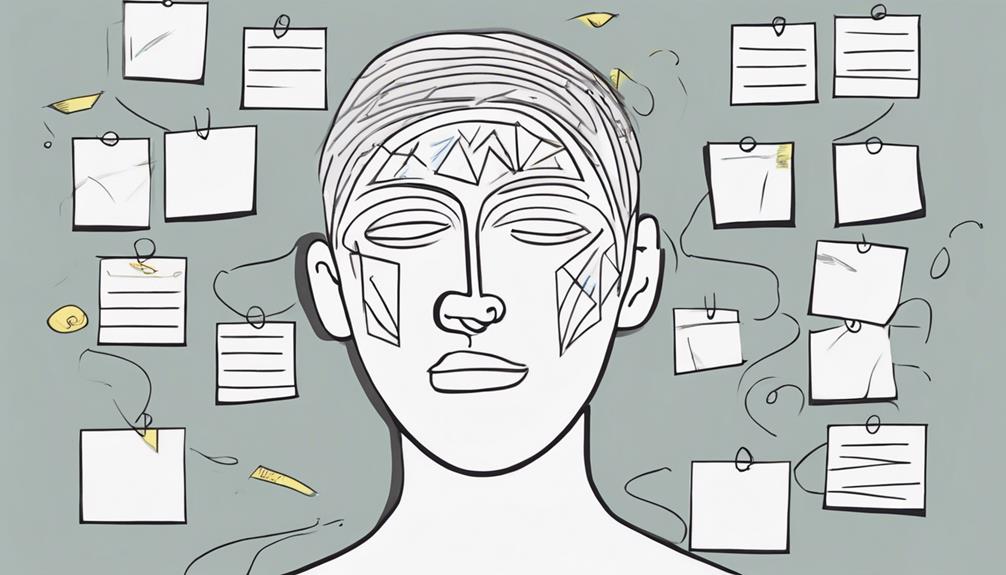Self-reflection stands as a cornerstone of personal development and growth, offering a profound opportunity for individuals to delve into the intricacies of their thoughts, actions, and emotions. This practice enables a deeper understanding of oneself and the world, fostering a continuous journey towards self-improvement and fulfillment. By peeling back the layers of our experiences and beliefs, we unravel the complexities of our minds and pave the way for profound transformations. The importance of self-reflection lies not only in its ability to illuminate our inner landscape but also in its power to shape our external realities in ways that are both profound and lasting.
Key Takeaways
- Enhances self-concept and values understanding.
- Improves communication skills and empathy.
- Fosters empathy and understanding in relationships.
- Facilitates emotional well-being and personal growth.
Self-Concept Enhancement

Self-reflection serves as a fundamental tool for individuals seeking to enhance their self-concept by delving into and comprehending their personal beliefs and values. Through introspection, individuals can gain a deeper understanding of themselves, leading to a more coherent self-identity. This process allows individuals to align their self-perception with their core values and beliefs, resulting in a more authentic self-concept. By evaluating their thoughts, emotions, and behaviors, individuals can identify their strengths and areas for improvement, contributing to a more balanced self-assessment.
Self-concept enhancement through self-reflection is crucial for personal growth and development. It enables individuals to cultivate self-awareness and establish a stronger connection with their true selves. By exploring their internal narratives and perceptions, individuals can refine their self-concept, fostering a positive self-image. Through regular self-reflection, individuals can continuously adapt and evolve, leading to a more fulfilling and authentic life. Ultimately, self-concept enhancement through self-reflection is a vital aspect of self-improvement and personal well-being.
Personal Growth Catalyst
A catalyst for personal growth, introspection, and self-awareness play pivotal roles in guiding individuals towards identifying areas for improvement and development in various facets of their lives. Through introspection, individuals engage in deep reflection on their thoughts, feelings, and actions, leading to a heightened sense of self-awareness. This process allows individuals to recognize patterns, strengths, weaknesses, and areas for enhancement.
Introspection serves as a powerful tool for personal growth by fostering a deeper understanding of oneself. By examining past experiences and behaviors, individuals can gain valuable insights that aid in decision-making and goal setting. This self-analysis enables individuals to align their actions with their core values and beliefs, promoting authenticity and personal fulfillment.
Research highlights the importance of engaging in introspection for professional success, as it distinguishes exceptional professionals from average ones. By embracing self-reflection as a continuous practice, individuals can cultivate self-improvement, enhance their skills, and navigate challenges more effectively. Ultimately, introspection acts as a catalyst for personal growth, empowering individuals to strive for continuous development and self-discovery.
Increased Self-Awareness

Enhancing self-awareness through introspection allows individuals to gain valuable insight into their thoughts, emotions, and behaviors. Understanding personal motives provides a clearer understanding of one's intentions and drives, fostering a deeper connection with oneself. Additionally, increasing emotional intelligence through self-reflection enables individuals to navigate complex social interactions with empathy and understanding.
Insight Through Introspection
Through introspection, individuals can uncover profound insights into their inner workings, facilitating a heightened level of self-awareness essential for personal growth and development. Introspection serves as a powerful tool for self-discovery, allowing individuals to delve deep into their psyche and emotions. Here are four key ways introspection leads to increased self-awareness:
- Identification of Patterns: Self-reflection helps in recognizing recurring thoughts, behaviors, and emotional responses.
- Understanding Strengths and Weaknesses: It enables individuals to assess their abilities objectively, acknowledging areas where improvement is needed.
- Enhanced Decision-Making: Increased self-awareness through introspection leads to more informed and mindful decision-making processes.
- Improved Relationships: By understanding oneself better, individuals can communicate more effectively and build healthier relationships.
Understanding Personal Motives
Increased self-awareness attained through self-reflection enables individuals to gain a profound understanding of their personal motives and desires by closely examining their thoughts, attitudes, and behaviors. This heightened self-awareness plays a crucial role in mental health professionals' work, allowing them to assist individuals in uncovering underlying motivations that drive their actions. By delving into one's inner workings, individuals can identify patterns, triggers, and subconscious beliefs that influence their decisions. This process not only aids in recognizing destructive behaviors but also empowers individuals to make positive changes in alignment with their core values. Mental health professionals often use techniques like journaling, mindfulness, or therapy to help individuals navigate this self-reflective journey and cultivate a deeper comprehension of their personal motives for improved well-being.
Enhancing Emotional Intelligence
Exploring one's inner landscape through self-reflection fosters a deeper understanding of emotional intelligence, particularly in the realm of increased self-awareness.
Importance of Self-Reflection in Enhancing Emotional Intelligence:
- Self-reflection enhances emotional intelligence by increasing self-awareness, a critical component of emotional intelligence.
- Research shows that self-awareness is the foundation of emotional intelligence, leading to better understanding and management of one's own emotions.
- Individuals who engage in self-reflection are more likely to recognize their emotions, strengths, weaknesses, and triggers, contributing to higher emotional intelligence.
- Emotional intelligence is linked to improved leadership skills, decision-making, and overall interpersonal effectiveness, all of which are enhanced through self-reflection.
Emotional Healing Tool

Self-reflection serves as a pivotal emotional healing tool, facilitating the processing and resolution of past emotional traumas. By creating a reflective space, individuals can delve into their emotions, allowing for a deeper understanding and acknowledgment of their feelings. This introspective process enables individuals to confront unresolved emotional issues, paving the way for healing and growth. Through self-reflection, individuals can release pent-up emotions, leading to emotional catharsis and a sense of relief. By examining their emotions and experiences, individuals can gain clarity, perspective, and closure, which are essential components of emotional healing. The act of self-reflection not only aids in identifying emotional wounds but also in actively working towards their resolution. This active engagement with one's emotions promotes inner peace, well-being, and a healthier emotional state. Ultimately, self-reflection serves as a powerful tool in the journey towards emotional healing and overall psychological wellness.
Clarity in Decision-Making
Assessing one's values, beliefs, and goals through self-reflection enhances clarity in decision-making, a crucial aspect of informed and deliberate choices. When individuals engage in self-reflection, they can benefit from the following:
- Increased Self-Awareness: Self-reflection allows individuals to gain a deeper understanding of themselves, their motivations, and their thought processes. This heightened self-awareness provides a solid foundation for making decisions that are in alignment with one's true self.
- Enhanced Problem-Solving Skills: By reflecting on past experiences and decisions, individuals can analyze what worked well and what didn't. This analytical approach helps in developing effective problem-solving strategies and making more rational decisions in the future.
- Alignment with Core Values: Self-reflection enables individuals to evaluate whether their decisions resonate with their core values and long-term objectives. This alignment ensures that decisions are not only logical but also ethical and meaningful.
- Reduced Impulsivity: Through self-reflection, individuals can identify patterns of impulsive behavior and learn to pause, reflect, and make decisions thoughtfully. This process reduces the likelihood of making hasty or regretful choices.
Strengthened Relationships

Self-reflection serves as a foundation for improved communication skills, fostering a deeper understanding of one's own emotions and those of others. This heightened empathy can lead to more meaningful and fulfilling relationships, as individuals become better equipped to navigate conflicts with grace and understanding. By honing conflict resolution skills through self-reflection, individuals can create an environment conducive to open and honest communication, strengthening the bonds they share with others.
Improved Communication Skills
Enhancing communication proficiency through introspective analysis cultivates more profound relational bonds across professional and personal spheres.
- Increased self-awareness leads to a better understanding of one's communication style and how it impacts others.
- Enhanced listening skills from self-reflection enable more meaningful exchanges and reduce misunderstandings.
- Improved empathy gained through self-reflection allows for better recognition and consideration of others' perspectives.
- Clear and authentic expression of thoughts and emotions, developed through self-reflection, fosters trust and openness in relationships.
Increased Empathy and Understanding
The cultivation of increased empathy and understanding plays a pivotal role in fortifying relationships across various domains, fostering deeper connections and mutual appreciation. Self-reflection enhances empathy by allowing individuals to understand their own emotions and motivations, which in turn helps them recognize and empathize with the feelings of others. Research indicates that engaging in self-reflection leads to more empathetic behaviors towards peers and colleagues. Through self-awareness gained from reflection, individuals can better comprehend different perspectives, enabling them to respond to others with empathy. This heightened empathetic capacity nurtured through self-reflection fosters a deeper level of understanding and connection with others. Consequently, it enhances communication and relationships by promoting a more empathetic and supportive environment.
Enhanced Conflict Resolution
Cultivating a deeper understanding of one's emotional responses and interpersonal dynamics can significantly contribute to more effective conflict resolution, ultimately strengthening relationships. When individuals take the time to reflect on their behaviors and reactions, they can enhance their conflict resolution skills in the following ways:
- Increased Self-Awareness: Self-reflection allows individuals to recognize their triggers and biases, helping them respond more empathetically during conflicts.
- Behavior Pattern Recognition: By reflecting, individuals can identify recurring patterns of behavior that contribute to conflicts and actively work on changing them.
- Enhanced Communication: Improved self-awareness from reflection enables better communication during conflicts, leading to more effective resolutions.
- Openness to Growth: Studies indicate that self-reflective practices result in stronger relationships as individuals become more open to feedback and personal growth.
Improved Problem-Solving Skills

Self-reflection serves as a fundamental practice for honing problem-solving skills through the systematic analysis of past decisions and outcomes. Engaging in self-reflection enables individuals to enhance their problem-solving abilities by identifying patterns in their decision-making processes and understanding the impact of their thoughts, emotions, and behaviors on problem-solving strategies. Research indicates that professionals who actively practice self-reflection are better equipped to tackle complex problems effectively. By fostering critical thinking and self-awareness, self-reflection plays a crucial role in developing the skills necessary for effective problem-solving.
| Benefits of Self-Reflection in Problem-Solving |
|---|
| 1. Enhances critical thinking skills |
| 2. Identifies patterns in decision-making |
| 3. Improves problem-solving strategies |
| 4. Fosters self-awareness and emotional intelligence |
| 5. Equips individuals to handle complex problems effectively |
Stress Reduction Mechanism
Self-reflection serves as a crucial stress reduction mechanism by enabling individuals to identify and address triggers contributing to their stress levels. Through the practice of self-reflection, individuals can develop mindfulness techniques, enhance emotional regulation skills, and achieve relaxation through increased self-awareness. This process aids in recognizing negative thought patterns, fostering resilience, and promoting overall well-being by effectively managing stressors.
Mindfulness Practice Benefits
Mindfulness practice has been scientifically proven to effectively reduce stress by activating the body's relaxation response. This practice offers various benefits:
- Symptom Reduction: Studies indicate that mindfulness practice can decrease symptoms of anxiety and depression.
- Emotional Regulation: Mindfulness meditation enhances emotional regulation and increases resilience to stress.
- Focus and Decision-making: Utilizing mindfulness techniques improves focus and attention, leading to better decision-making processes.
- Cortisol Reduction: Regular mindfulness practice has been linked to reduced cortisol levels, the stress hormone, in the body.
These findings highlight the significant impact that mindfulness practice can have on stress reduction and overall well-being.
Emotional Regulation Techniques
Utilizing effective emotional regulation techniques is essential for promoting stress reduction and enhancing overall well-being through scientifically proven methods. Techniques like mindfulness meditation and deep breathing can help individuals manage their emotions, leading to a decrease in stress levels. By incorporating these practices into daily routines, individuals can experience a reduction in cortisol levels, which is crucial in combating the negative effects of stress on the body. Furthermore, emotional regulation techniques not only improve mood and resilience but also have a positive impact on physical health by lowering blood pressure and heart rate. Self-reflection plays a key role in the implementation of these techniques, allowing individuals to understand their emotions better and choose appropriate strategies for stress reduction.
Relaxation Through Self-Awareness
Increased self-awareness plays a pivotal role in promoting relaxation and reducing stress levels through the mechanism of relaxation through self-awareness. Self-reflection aids in stress reduction by enhancing self-awareness and facilitating relaxation. Here are four ways in which self-awareness contributes to relaxation and stress reduction:
- Identification of Stress Triggers: Self-reflection enables individuals to pinpoint specific situations or thoughts that lead to stress.
- Development of Coping Strategies: Through self-awareness, individuals can devise effective coping mechanisms to manage stress triggers.
- Calming the Mind: Regular self-reflection practices result in a calmer mind, reducing overall stress levels.
- Enhanced Emotional Well-being: Improved self-awareness through mindfulness practices fosters emotional well-being and relaxation.
Enhanced Goal-Setting Abilities
Self-reflection plays a crucial role in enhancing individuals' ability to set clear and achievable goals by providing valuable insights into their objectives and priorities. Research indicates that professionals who actively engage in self-reflection are more likely to establish specific and attainable goals. By reflecting on past experiences, individuals can gain valuable insights that inform effective goal-setting strategies. This process allows for a deeper understanding of one's values and aspirations, enabling individuals to align their goals more closely with what truly matters to them. Self-reflection fosters self-awareness, a key component in setting realistic and meaningful goals. Through introspection, individuals can better understand their strengths, weaknesses, and areas for improvement, leading to more focused and purposeful goal-setting. Overall, the practice of self-reflection empowers individuals to set goals that are not only achievable but also deeply meaningful and aligned with their personal values and aspirations.
Boosted Creativity and Innovation

Enhancing one's capacity for creative thinking and fostering a culture of innovation can be facilitated through the practice of self-reflection. Self-reflection plays a crucial role in boosting creativity and innovation by enabling individuals to delve deeply into their thoughts, ideas, and experiences. Here are four ways in which self-reflection contributes to enhanced creativity and innovation:
- Exploration of Ideas: Self-reflection allows individuals to explore different perspectives and consider unconventional solutions, leading to innovative ideas.
- Stimulating Divergent Thinking: Research indicates that self-reflection stimulates divergent thinking, a cognitive process essential for generating creative and original ideas.
- Fresh Perspectives: Engaging in self-reflection provides individuals with fresh perspectives on challenges, encouraging them to think outside the box and come up with innovative solutions.
- Inspiring Uniqueness: Individuals who practice self-reflection are more likely to develop unique and original ideas, contributing to a culture of innovation and creativity.
Cultivating a habit of self-reflection can significantly boost creativity, inspire innovation, and drive inventive problem-solving approaches.
Heightened Self-Confidence
Engaging in the practice of self-reflection has been demonstrated to positively impact individuals' self-confidence by fostering a deeper recognition of their strengths and accomplishments. Studies indicate that self-reflection plays a crucial role in boosting self-esteem and belief in one's abilities. By reflecting on past successes and achievements, individuals can develop a more positive self-image and reinforce their capabilities, leading to heightened self-confidence.
Self-reflection allows individuals to acknowledge their progress over time, which in turn promotes increased self-assurance. By assessing their accomplishments through introspection, individuals can cultivate a sense of self-worth and confidence in their abilities. This process of self-assessment and recognition of personal growth not only enhances self-confidence but also provides a solid foundation for individuals to tackle challenges and pursue their goals with a strong belief in themselves. In essence, self-reflection acts as a powerful tool in nurturing self-esteem and fostering a positive self-perception, ultimately contributing to heightened self-confidence.
Accelerated Learning Process

Building upon the foundation of heightened self-confidence established through self-reflection, the accelerated learning process is facilitated by a deepened self-awareness and understanding of one's experiences. Self-reflection plays a crucial role in expediting the learning journey through various mechanisms:
- Identification of Patterns: By engaging in self-reflection, individuals can recognize recurring patterns in their learning process, enabling them to make necessary adjustments for improvement.
- Insight into Behaviors and Triggers: Self-reflection allows for the identification of behaviors and triggers that either facilitate or hinder learning, providing an opportunity for targeted interventions.
- Learning from Past Experiences: Reflecting on past successes and failures offers valuable insights that can guide individuals towards continuous growth and development in their learning endeavors.
- Adaptation of Learning Strategies: Through self-reflection, individuals can assess the effectiveness of their current learning strategies and adapt them to enhance efficiency and productivity.
Empowered Self-Management
Self-reflection serves as a cornerstone in fostering empowered self-management, empowering individuals to cultivate self-awareness and take charge of their actions and decisions effectively. By engaging in self-reflection, individuals can enhance their understanding of their thoughts, emotions, and behaviors, leading to improved self-awareness. This heightened self-awareness enables individuals to recognize their strengths and weaknesses, identify areas for personal growth, and align their actions with their values and goals.
Moreover, self-reflection plays a crucial role in promoting accountability and empowerment in managing one's life. When individuals reflect on their experiences and choices, they are better equipped to make informed decisions and take ownership of the outcomes. Research suggests that individuals who actively engage in self-reflection demonstrate enhanced self-management skills, setting them apart as exceptional professionals.
In essence, self-reflection acts as a catalyst for personal development, empowering individuals to navigate life with a greater sense of self-awareness, accountability, and effectiveness in decision-making.
Life Satisfaction Amplifier

Self-reflection serves as a powerful catalyst for personal growth, fostering emotional awareness and enhancing clarity in setting and achieving goals. By engaging in self-reflection, individuals can gain deeper insights into their values and aspirations, ultimately leading to increased satisfaction with life. This process empowers individuals to make informed decisions, cultivate healthier relationships, and navigate life with a sense of purpose and fulfillment.
Personal Growth Catalyst
How does the practice of introspective analysis serve as a catalyst for personal growth, significantly amplifying individuals' levels of life satisfaction and fulfillment? Self-reflection is a powerful tool that fosters personal development and enhances overall well-being. Here are four ways in which self-reflection acts as a catalyst for personal growth:
- Enhanced Self-Awareness: Self-reflection allows individuals to gain a deeper understanding of themselves, their values, and their beliefs, leading to increased self-awareness.
- Learning from Experiences: By reflecting on past experiences, individuals can learn valuable lessons and insights, facilitating personal growth and development.
- Goal Alignment: Self-reflection enables individuals to align their actions with their goals and aspirations, promoting growth in the desired direction.
- Continuous Improvement: It serves as a mechanism for continuous improvement, empowering individuals to make positive changes and progress towards their full potential.
Emotional Awareness Enhancer
Enhancing emotional awareness through introspective analysis has been shown to significantly contribute to increased life satisfaction levels. Research indicates that individuals who engage in self-reflection tend to develop a higher level of emotional intelligence. By actively reflecting on one's thoughts and experiences, individuals can identify and understand their emotions and reactions more effectively. This process enables them to recognize patterns in their emotional responses and behaviors, leading to a greater sense of emotional awareness. Improved emotional awareness, in turn, can positively impact relationships and overall well-being. Therefore, practicing self-reflection not only enhances emotional intelligence but also fosters a deeper understanding of one's emotional landscape, ultimately contributing to higher levels of life satisfaction.
Goal Clarity Enhancer
Enhancing one's understanding of personal goals through introspective analysis is a crucial factor in clarifying direction and fostering increased life satisfaction. Self-reflection serves as a goal clarity enhancer by providing individuals with a clearer sense of purpose and direction. This process helps prioritize tasks, enabling individuals to focus on what truly matters to them. Additionally, the clarity gained through self-reflection diminishes feelings of confusion and indecisiveness, empowering individuals to make more informed decisions. By comprehending their goals better, individuals can progress towards their desired outcomes with a heightened level of determination and satisfaction.
Frequently Asked Questions
What Is Self-Reflection and Its Importance?
Reflective practice is the process of examining one's thoughts, emotions, and behaviors to gain insights into oneself. It plays a crucial role in enhancing internal awareness, personal identity, and self-concept. Self-reflection is imperative for personal growth, identifying areas for improvement, and boosting self-awareness. By focusing on 'what' rather than 'why,' individuals can maintain objectivity and cultivate a non-judgmental attitude towards themselves, fostering a deeper understanding of their inner workings.
What Is Reflection and Why Is It Important?
Reflective practice is a deliberate process of thinking about one's actions, behaviors, and decisions to gain deeper insights and understanding. It is crucial in professional settings as it allows individuals to evaluate their performance, identify strengths and weaknesses, and make constructive changes. Through reflective practice, professionals can enhance their skills, improve decision-making, and foster continuous learning and development. This self-directed approach is vital for personal growth and professional advancement.
Why Is Reflection Important to Us?
Reflection is crucial for personal growth. By examining our experiences, we gain insights into our strengths and weaknesses, fostering continuous improvement. This process allows us to better understand ourselves, refine our decision-making skills, and adapt to challenges effectively. Through reflection, we can identify areas for development, enhance our self-awareness, and ultimately strive towards becoming the best version of ourselves both personally and professionally.
Why Is Reflection Important in Real Life?
Reflection benefits individuals in real life by fostering personal growth, enhancing decision-making skills, and improving communication abilities. Through introspection on experiences like surprises, frustrations, and failures, individuals can develop resilience and adaptability. Neglecting self-reflection may lead to burnout and hinder professional advancement. By engaging in self-reflection, individuals can gain insights into their behaviors, emotions, and thought processes, ultimately leading to improved performance and well-being in various aspects of life.
Conclusion
In conclusion, self-reflection serves as a powerful tool for enhancing self-concept, promoting personal growth, and increasing self-awareness. It aids in emotional healing, facilitates clarity in decision-making, and boosts self-confidence. By engaging in self-reflection, individuals can accelerate their learning process, empower self-management, and amplify life satisfaction. Embracing this practice is essential for continual improvement and fulfillment. Remember, the journey of self-discovery is an endless adventure waiting to be explored.
